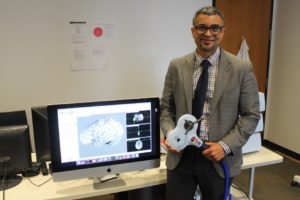
We spoke with Dr. Roy Hamilton, Associate Professor in the departments of Neurology and Physical Medicine and Rehabilitation at the University of Pennsylvania, where he also directs the Laboratory for Cognition and Neural Stimulation (LCNS). Dr. Hamilton has been engaged in research in the field of brain stimulation since 1998, and has employed transcranial magnetic stimulation (TMS) and transcranial electrical stimulation (tDCS) in a range of studies exploring a variety of topics including cognitive control, visuospatial processing, language production, semantic memory, and creativity.
NTS/NYN: Can you describe the more formative experiences in his education or training that informed his current research?
My career in neuromodulation has focused on employing noninvasive brain stimulation techniques such as TMS and tDCS as tools for the elucidating systems-level neuroscientific principles that give rise to human cognition, and to employ the same tools to enhance the recovery of patients with focal deficits of cognition resulting from brain insults such as stroke and neurodegenerative disease.
In terms of specific technologies, ideas, or applications that inspired me, my formative years were spent at the Beth Israel Deaconess Medical Center and Harvard Medical School in Boston, where I developed a passion for neuromodulation by working with Alvaro Pascual-Leone, MD, PhD. Dr. Pascual-Leone is considered a pioneer in the field of noninvasive brain stimulation. In subsequent years, I had the opportunity to grow as a behavioral neurologist by working with another luminary in this field, H. Branch Coslett, MD at the University of Pennsylvania.
I’ve enjoyed approximately 20 years in the field of noninvasive brain stimulation, and I eagerly look forward to the discoveries and challenges that the future holds for this field.
NTS/NYN: What excites you about this year’s Joint Meeting of Neuromodulation: The Science and NYC Neuromodulation?
In recent years I have witnessed remarkable advances in the ability of neuroscience to characterize and influence brain circuits that drive sensorimotor functions, cognition, and behavior. Neuromodulation techniques have emerged as especially powerful tools, both for interrogating intact brain centers experimentally and for promoting recovery in patients with neurologic deficits, cognitive impairments, and psychiatric symptoms. I am most excited that neuromodulation approaches are increasingly being combined synergistically with other cutting-edge advances in neuroscience in order to make increasingly sophisticated inferences about the structure/function relationships that underlie cognition, perception, and action, the mechanisms by which neurologic and psychiatric disorders negatively impact these processes, and the ways in which novel neuromodulation-based interventions may be effective in treating these conditions.
I am looking forward to this opportunity for both eminent thought leaders and rising stars in the field of neuromodulation to share their groundbreaking insights at NTS/NYN 2019. These insights are supported by the most robust scientific evidence available.
Neuromodulation: The Science & NYC Neuromodulation sessions will include topics on neural engineering, deep brain stimulation, spinal cord stimulation, closed loop brain machine interfacing, bioelectronic medicine, non-invasive brain stimulation, and non-invasive stimulation of organ systems. Please take a moment to view the complete scientific agenda. NTS/NYN will be held in Napa, CA on October 3–6, 2019.
